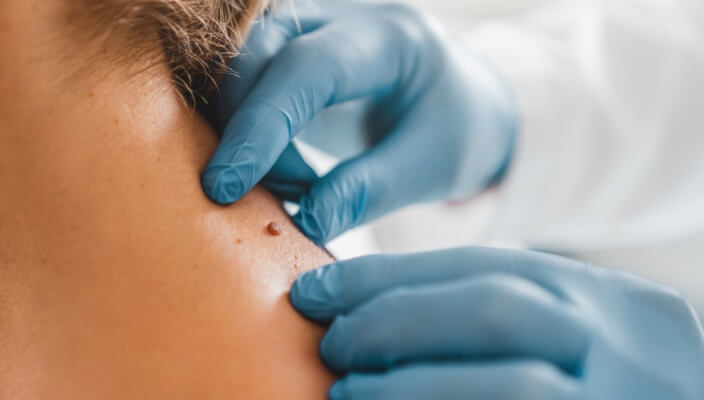FAQs
FREQUENTLY ASKED QUESTIONS
Do you have a question about dermatology, skin surgery, or cosmetic dermatology? Ask a dermatologist or read our frequently asked questions! All of the dermatology questions below are answered and reviewed by the board-certified dermatologists at Brentwood Dermatology.
Learn more about dermatology, skin surgery, and cosmetic procedures at Brentwood Dermatology. Read the guide below, where our board-certified dermatologists answer frequently asked questions and address common misconceptions.
General Dermatology Questions
Dermatology is a branch of medicine that specializes in treating conditions of the skin, hair, and nails. For instance, a doctor who specializes in dermatology, otherwise known as a dermatologist, will be experienced in treating and diagnosing various skin conditions, such as acne, rosacea and types of skin cancer.
Dermatologists are specially trained in the diagnosis and treatment of various conditions of the hair skin and nails. On average, a dermatologist can diagnose and treat over 3,000 conditions. This includes conditions such as acne, rosacea, psoriasis, dermatitis, suspicious moles, hair loss, and more. If you have a chronic skin issue, schedule an appointment with one of our trusted skin experts.
This depends on your symptoms and reasons for seeing a dermatologist. A Total Body Skin Exam (TBSE) is a skin screening where your dermatologist will look for abnormal moles, suspicious spots, and unusual patches on the skin. TBSEs should be scheduled regularly, and are a crucial part of skin cancer prevention, and early detection. You can also see a dermatologist for a specific hair, skin or nail issues you may have. Here, they will address your concerns and create a custom treatment plan based on your individual needs.
Yes, the board-certified dermatologists at Brentwood Dermatology treat acne! We're passionate about helping our patients achieve smooth, clear skin through effective acne treatment options such as isotretinion and prescription topicals. Our dermatologists will create a customized treatment plan to help you regain confidence in your skin.
Yes, the board-certified dermatologists at Brentwood Dermatology are experienced in treating chronic skin conditions such as psoriasis, eczema, rosacea, and more to help our patients find relief. If you are experiencing an issue with your hair, skin or nails, schedule an appointment with one of the trusted skin expert at Brentwood Dermatology to start your journey to healthy skin!
This depends on your specific insurance plan. However, we find most skin cancer screenings and general dermatology visits are covered by our patient’s insurance.
Skin Cancer & Surgical Dermatology Questions
No, not all skin cancers are the same. There are several different types of skin cancers and they can impact the health of your skin in different ways. Additionally, they are often treated differently depending on the severity, and type of skin cancer. For instance, basal bell barcinoma (BCC) is often superficial on the skin and easily treated, whereas melanoma is more likely to spread and tends to be more dangerous. Getting a regular Total Body Skin Exam (TBSE) is crucicial for prevention, and early detection of skin cancer. Schedule your TBSE with one of our trusted skin experts.
Dermatological skin surgery involves the diagnosis and treatment of various skin conditions of the skin and surrounding tissues by several surgical, cosmetic and non-surgical methods. The purpose of skin surgery is to repair and/or improve the function and cosmetic appearance of skin tissue. A Total Body Skin Exam is the first step to determine if skin surgery is needed.
We recommend scheduling regular Total Body Skin Exams (TBSEs) with your trusted skin expert. Your dermatology provider while continie to asses your skin for any irregular moles or spots that may be concerning. You may also perform skin self-exams to keep an eye out for irregularities or changing spots.
Be on the look out for the ABCDEs of skin cancer:
(A) Asymmetry: when one half of a mole or mark is different from the other half
(B) Border: the edges of the mole or mark are scalloped, uneven, notched, or irregular
(C) Color: the mole or mark is not a uniform color throughout; it can be different shades of the same color, or pink, red, or white in a spot that is otherwise brown or black
(D) Diameter: if the mole or mark is 6 millimeters (about the size of a pencil eraser) or larger, it could be a melanoma, BUT it’s also possible for melanoma to be smaller than 6 mm
(E) Evolving: the mole or mark is changing in size, shape, color, or texture
If you notice any of these warning signs, it is important to schedule an appointment with one of our dermatologists immediately. It is important to note that note that not all melanomas show these warning signs.
Cosmetic Dermatology Questions
Cosmetic dermatology focuses on improving the appearance of the skin, hair, and nails through various treatments and procedures, such as BOTOX®, fillers, laser therapy, facials, and chemical peels, to enhance aesthetic appeal and address issues like aging and skin texture. Brentwood Dermatology offers various cosmetic dermatology services to help enhance your natural glow.
While topical creams may exfoliate and smooth the skin's surface to reduce the appearance of wrinkles, they do not achieve a permanent effect on wrinkles because there is no chance ade in the skin's collagen understructure. The daily use of topical creams and sunscreen is a great way to prevent wrinkles from forming. Shop our online store for high-quality, medical-grade skincare and sunscreens.
Yes! At Brentwood Dermatology, we have experienced dermatologists, aestheticians, and fully-trained nurse practitioners who perform anti-aging treatments to help patients address signs of aging, such as wrinkles, fine lines, and dark spots. These treatments may include chemical peels, dermal fillers, or BOTOX®. Schedule a consultation with one of our skin experts today to start your journey to healthy skin and regain your confidence!
At Brentwood Dermatology, our chemical peels, dermal fillers, sclerotherapy, and BOTOX® treatments are performed by our experienced board-certified dermatologists.

SCHEDULE AN APPOINTMENT TODAY!
If you have questions about our board-certified dermatologists, or the treatments available to you in Brentwood, Tennessee, contact our experienced staff at Brentwood Dermatology and let us schedule an appointment for you to meet with out qualified skin experts. Contact us online or call our office at 615.377.3448!

